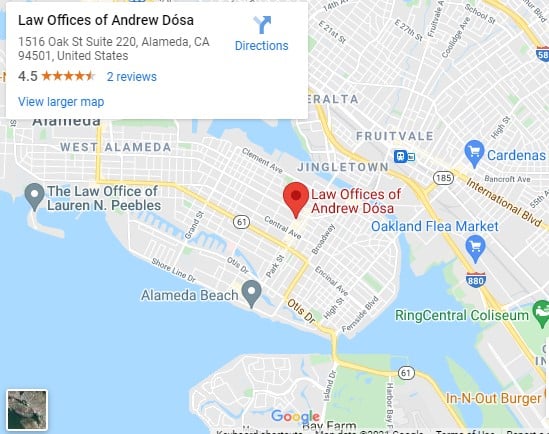Do you remember getting a box of Cracker Jacks, that caramel covered popcorn with peanuts? There was always some kind of “prize” inside. The coolest had to be the secret decoder ring. When you are forced to deal with the criminal justice system in California, it is only a matter of time before you hear people speaking in legal code. How do you decipher this strange language? Is there a legal decoder ring? There is no easy answer. There is no legal decoder ring in a Cracker Jacks box. But you can keep this article. We will identify, define and explain some of the more common code words and secret case names.
APPRENDI-BLAKELY WAIVER: Blakely v. Washington (2004) 524 US 296, 124 SCt 2531, 159 L Ed2d 403, 124 SCt 2531; Apprendi v. New Jersey (2000) 530 US 466, 147 LEd 2d 435, 120 SCt 2348.
Defendant may waive the right to a jury trial of facts in aggravation or an enhancement (which make the upper term more likely to be imposed.) Waiving this right may make it easier to get the more favorable terms of a plea bargain Apprendi requires a prosecutor to specifically allege and prove, or have the defendant admit any enhancement. When the court uses a fact (other than the fact of a prior conviction) not proven to the jury or admitted by defendant to impose a sentence
beyond the statutory maximum sentence, the court violates defendant’s Sixth and Fourteenth Amendment rights.
ARANDA-BRUTON RULE/MOTION People v. Aranda (1965) 63 C2d 518, 47 CR 353; Bruton v. United States (1968) 391 US 123, 20 LEd2d 476, 88 SCt 1620.
When two or more defendants are jointly charged, and one made an out-of-court statement that blames the other, the co-defendant may move to sever his case from the accuser’s case. If the statement cannot be left out of the case, and harm to the co-defendant cannot be avoided, the prosecution must agree not to use the statement or the severance must be granted.
ARBUCKLE WAIVER: People v. Arbuckle (1978) 22 C3d 749, 150 CR 778, 587 P2d 220.
Defendant can waive his right to be sentenced by the same judge who presided over the trial or who accepted the change of plea. Don’t waive this right if there is any real chance the sentencing judge might not accept the terms of your deal and the judge taking the plea would accept it. Without a knowing and intelligent Arbuckle waiver by defendant, any sentencing imposed by another judge is unlawful.
BAIN ERROR People v. Bain (1971) 5 C3d 839, 97 CR 684, 489 P2d 564.
At trial, a prosecutor cannot give his personal opinion that defendant is guilty unless the prosecutor specifically says the opinion is based on the trial evidence.
BEAGLE-CASTRO MOTION People v. Beagle (1972) 6 C3d 441, 99 CR 313, People v. Castro (1985) 38 C3d 301, 211 CR 719.
If defendant has one or more prior felony convictions, he can ask the court to decide if, under Evidence Code section 352, impeachment of defendant by one or more of the priors would be unduly prejudicial/unfair to defendant.
BATSON-WHEELER CHALLENGE: Batson v. Kentucky (1986) 476 US 79, 90 LEd2d 69, 106 SCt 1712; People v. Wheeler (1978) 22 C3d 258, 148 CR 890.
The Equal Protection Clause of the US Constitution’s Fourteenth Amendment impacts jury pools and selection. Defendant is entitled to a jury panel approximating the ideal cross-section of the community as a random drawing would allow, though this does not guarantee the jury will have a member of defendant’s “group” or that the jury includes any particular group of individuals. During jury voir dire, peremptory challenges by any party may not be used to systematically eliminate jurors who are members of “cognizable” groups (with characteristics like race, ethnicity or religion). See Cal. Code of Civil Procedure §231.5.
BOYD ERROR: People v. Boyd (1985) 38 C3d 762, 215 CR 1.
In death penalty cases, the trier of fact may be able to consider violent conduct or threats of violence which are crimes other than those involved in the case being prosecuted when determining the sentence. See Penal Code Sec. 190.3(b).
BOYKIN-TAHL RIGHTS: Boykin v. Alabama (1969) 395 US 238, 23 LEd2d 274, 89 SCt 1709; In re Tahl (1969) 1 C3d 122, 81 CR 577.
Before the court can accept a guilty plea, the record must show defendant was aware of and then knowingly and intelligently waived the rights to a jury trial, to confront witnesses, and against self-incrimination. Further, defendant must be advised of the nature of the charge(s) and consequences of pleading guilty. These rights apply to allegations or enhancements admitted when the guilty plea is entered.
BRACAMONTE MOTION: People v. Bracamonte (1981) 119 CA3d 644, 174 CR 191.
When charged with a “status” enhancement (e.g., having a prior conviction or committing a crime while on bail in another case), defendant may move to bifurcate the trial so the jury is not prejudiced by knowing about the “status” enhancing allegation. See also People v. Calderon (1994) 9 C4th 69, 36 CR2d 333.
BRADY DISCOVERY: Brady v. Maryland (1963) 373 US 83, 10 LEd2d 215, 83 SCt 1194.
The Due Process Clause of the Fourteenth Amendment requires the State to disclose favorable evidence material either to guilt or to punishment. “Material” means there is a reasonable probability the outcome of the trial would have been different if the evidence had been disclosed.
BUNNELL ADVISEMENTS OR “SLOW” PLEA: Bunnell v. Superior Court (1975) 13 C3d 592, 119 CR302.
In court trials, the parties may submit evidence that is not live testimony (e.g., a preliminary hearing transcript, police reports or facts stipulated to by the parties). Typically, in these cases it is understood defendant is not contesting guilt. There may even be an agreement to the sentence imposed, if the court finds defendant guilty.
BURKS WAIVER: People v. Burks (1998) 66 CA4th 232, 77 CR2d 840.
Defendant may waive time served credits on a probation violation to get local time rather than a prison commitment. However, if defendant later violates probation, the waiver of those credits remains. In effect, once waived, those credits are forever waived.
CHAPMAN STANDARD Chapman v. California (1967) 386 US 18, 17 LEd2d 705, 87 SCt 824.
When appellant establishes his federal constitutional rights are violated, reversal is required unless the prosecutor convinces the court beyond a reasonable doubt the verdict would have been different had the violation not occurred. If the reasonable doubt standard is not met, the violation is harmless error. See Aranda-Bruton rule above.
CRAWFORD ERROR Crawford v. Washington (2004) 541 US 36, 158 LEd2d 177, 124 SCt 1354.
Following Aranda-Bruton, Crawford concluded that admitting into evidence a defendant’s outofcourt (extrajudicial) statement violated the co-defendant’s Sixth Amendment right to confront the speaker of the statement.
CRUZ/VARGAS WAIVER: Cruz v. People (1988) 44 C3d 1247, 246 CR 1, 752 P.2d 439; People v. Vargas (1990) 223 CA3d 1107. And see People v Masloski (2001) 25 C4th 1212, 108 CR2d 484, 25 P.3d 681.
Penal Code Section 1192.5 allows a defendant to withdraw a plea if the sentencing judge does not agree to the plea bargain, even if the defendant does not appear at sentencing. (That failure to appear would be a separate offence under Penal Code §§1320 and 1320.5.) By waiving the Cruz right, defendant might get a harsher or maximum sentence if he does not appear at sentencing, commits a new offense before sentencing, or by failing to report to probation. If not advised of the right to withdraw his plea at sentencing, defendant must show this is not just harmless error.
DENNIS H. HEARING: In re Dennis H. (1971) 19 CA3d 350, 96 CR791.
In juvenile cases, the minor has the right to a re-hearing if the probation officer or preparer of the reports is not present at the detention hearing. The re-hearing has been called a contested detention hearing.
DOYLE ERROR: Doyle v. Ohio (1976) 426 US 610, 49 LEd2d 91.
When defendant remained silent while receiving Miranda warnings, and then made exculpatory statements, the prosecution may not impeach defendant on the later statements by telling the jury about defendant’s initial silence after getting the Miranda warnings.
ESTEYBAR MOTION Esteybar v. Municipal Court (1971) 5 C3d 119, 95 CR 524.
Under Penal Code Sec. 17(b)(5), defendant can move to reduce a wobbler to a misdemeanor. The DA’s consent is not required. If the motion is granted, the DA cannot re-file the case as a felony.
EVANS LINEUP: Evans v. Superior Court (1974) 11 C3d 617, 114 CR 121.
Defendant may move for a lineup. The motion must be timely, the eyewitness identification is a material issue, and there must be a reasonable likelihood of a mistaken (prior) identification. The new lineup would resolve the issue of the prior mistake.
FARES MOTION People v. Fares (1993) 16 CA4th 954, 20 CR2d 314; Pen. Code § 1237.1.
If the trial court miscalculates the pre-sentence credits award, defendant must move to get those credits recognized. Until the motion is made, the issue cannot be raised on appeal. Someone in a work furlough program gets credits when living in county jail, a work furlough facility or halfway house, but does not get credits when not actually in custody.
FARETTA WAIVER Faretta v. California (1975) 422 US 806, 45 LEd2d 562, 95 SCt 2525.
On a basic showing of competence, a criminal defendant may demand to represent himself at trial. There is no federal constitutional right to self-representation on appeal.
FRANKS HEARING Franks v. Delaware (1978) 438 US 154, 57 LEd2d 667, 98 SCt 2674.
Similar to a motion to suppress, a Franks motion seeks to “traverse” or “quash” a warrant. To have a hearing on the motion, defendant must make a substantial preliminary showing that the declaration/affidavit supporting the warrant contained a false statement that was made knowingly or in reckless disregard of the truth, and the statement was material–“necessary to the magistrate’s finding of probable cause.”
GRIFFIN ERROR Griffin v. California (1965) 380 US 609, 14 LEd2d 106, 85 SCt 1229.
A prosecutor is not permitted to comment to the jury on a defendant’s exercise of the right against self-incrimination.
HAMMON-REBER MOTION: People v. Hammon (1997) 15 CA4th 1117, 65 CR2d 1, People v. Reber (1986) 177 CA3d 523, 223 CR139, and Penal Code §1054(e).
A motion to obtain the psychiatric records of a prosecution witness, this defense right has survived various challenges, as it is supported by the United States Constitution.
HARVEY WAIVER: People v. Harvey (1979) 25 C3d 754, 159 CR 696.
Without defendant’s waiver, the sentencing court or probation report may not consider facts related to cases or counts dismissed pursuant to a plea deal. The dismissed counts must be “transactionally related” to the crimes for which defendant is being sentenced. With a waiver, defendant can be required to pay restitution to victims of crimes alleged in dismissed or unfiled counts and cases.
HARVEY-MADDEN RULE: People v. Harvey (1958) 156 CA2d 516, 319 P2d 689; People v. Madden (1970) 2C3d 1017, 88 CR 171.
At a hearing on a Motion to Suppress, the evidence must show the police officer had probable cause to act. The officer can have personal knowledge of facts constituted probable cause. If he did not have personal knowledge, then it must be shown that it was reasonable for him to rely on information he obtained. This information must be “factual,” reliable and specific, not conclusory.
HITCH-TROMBETTA-YOUNGBLOOD MOTION People v. Hitch (1974) 12 C3d 641, 117 CR 9, 527 P2d 361; California v. Trombetta (1984) 467 US 479, 81 LEd2d 413, 104 SCt 2528; Arizona v. Youngblood (1988) 488 US 51, 102 LEd2d 281, 109 SCt 333.
Generally the “People” have the duty to reveal/preserve information or evidence helpful to the defendant. This means there exists a “reasonable possibility” the evidence would be material and favorable. If law enforcement’s loss or destruction of favorable evidence (police officer notes or test results/samples) infringes defendant’s due process rights, the defendant may get sanctions, and perhaps even a dismissal. Trombetta was a DUI case. The court concluded breath samples
did not need to be preserved before the breath analysis test results could be introduced at trial.
HOBBS MOTION: People v. Hobbs (1994) 7 CA4th 948, 30 CR2d 651.
A motion to force the DA to disclose the identity of a material informant. The motion should be granted if the informant is a material witness to guilt or innocence, and denied if the informant only gave information on probable cause. There must be more to the motion than speculation, the desire to cross-examine the informant, or only a prima facie showing. In some situations, the court may have an in camera (private–in the judge’s chambers) hearing. See Penal Code §1042(d) and People v. Flannel (1979) 25 C3d 668, 160 CR 899.
JOHNSON WAIVER: People v. Johnson (2002) 28 C4th 1050, 123 CR 700, 51 P.3d 913.
Defendant can expressly waive credits for time served (or future time to be served) even if that means total time in custody exceeds the maximum term of the sentence. This may allow the court to reinstate probation and impose a one year jail sentence. Prison time can be held over defendant’s head if there is a future probation violation.
KELLETT RULE: Kellett v. Superior Court (1966) 63 C2d 822, 48 CR 366.
The DA must join in one case all offenses/counts where the same act or court of action plays a significant part. In Kellett, defendant was convicted of brandishing a weapon and should have also been charged with being an ex-felon in possession of a concealable weapon.
KELLY–FRYE TEST: People v. Kelly (1976) 17 C3d 24, 130 CR 144; Frye v. United States (DC Cir 1923) 293 F 1013.
The Test concerns admissibility of (new) scientific or experimental tests and their acceptance or recognition in the scientific community. The test does not generally apply to psychologocal or psychiatric evidence or assessments of the mental state of a defendant. See Evidence Code Sec. 801 and Penal Code §§28 and 29.
KURTZMAN ERROR People v. Kurtzman (1988) 46 C3d 322, 250 CR 244.
The judge shall instructing the jury to not deliberate on necessarily included lesser offenses unless it first acquits defendant of the greater offense. Kurtzman held that Stone v. Superior Court (1982) 31 C3d 503, 183 CR 647 does not prohibit the jury from considering or discussing a lesser offense before returning a verdict on a more serious offense, but acquittal on the greater charge must be reached before any verdict on a lesser one.
LEON “GOOD FAITH” EXCEPTION United States v. Leon (1984) 468 US 897, 82 LEd2d 677, 104 SCt 3405.
Even if a defendant shows a search warrant was defective or not supported by probable cause, any evidence seized may still be admissible if the officer executing the search warrant reasonably and in good faith believed the warrant was valid.
LUTTENBERGER MOTION: People v. Luttenberger (1990) 50 C3d 1, 265 CR 690.
A motion to secure information on a confidential informant. The informant’s disclosure may not be required if the informant is not a material witness to guilt or innocence, and his information only went to probable cause.
MARSDEN MOTION People v. Marsden (1970) 2 C3d 118, 84 CR 156.
Defendant can move to fire his public defender/appointed attorney and request another appointed attorney. Defendant may not have to demonstrate inadequate representation or show an irreconcilable conflict with counsel. The court will not necessarily appoint another attorney.
MASSIAH ERROR: Massiah v. U.S. (1964) 377 US 201, 12 LEd2d 246 84 SCt 1199.
Massiah extends defendant’s Miranda rights to cover secretive questioning by an undercover peace officer or agent (an informant or co-defendant/co-principal.)
MEJIA ERROR: People v. Mejia (1976) 57 CA3d 574, 129 CR 192.
If government action makes a material witness unavailable (e.g., by deportation), the case must be dismissed. Which cases apply (federal v. California) and what is “material” cloud the issue. A guilty plea waives the right.
MINOR HEARING: People v. Minor (1980) 104 CA3d 194, 163 CR 501.
An appellate court considering the trial court’s ruling on a Marsden motion can remand the case to the trial court to conduct a Marsden hearing.
MIRANDA RIGHTS Miranda v. Arizona (1966) 384 US 436, 16 LEd2d 694, 86 SCt 1602.
When a person is no longer free to leave (i.e., is “under arrest” or “in custody”), the peace officer must give Miranda warnings: you have the right to remain silent, anything you say can be used against you, you have the right to an attorney, and one will be appointed if you cannot afford one. If the person is arrested, but not given Miranda warnings, his rights are not violated if there is no further communication between the person and officer.
MORRISSEY HEARING–MORRISSEY-VICKERS RIGHTS Morrissey v. Brewer (1972) 408 US 471, 33 LEd2d 484, 92 Sct 2593; People v. Vickers (1972) 8 C3d 451, 105 CR 305.
Morrissey established minimal due process requirements in parole revocation proceedings including evidentiary rules, the standard applied to prove the violation, and a hearing where the violation is proved. Vickers concerns due process requirements for probation revocation hearings. The standard of proof is a preponderance of the evidence (51% of the weight of evidence–enough to tip the scale), not beyond reasonable doubt, as in a criminal case. In Valdivia v. Davis (ED Cal 2002) 206 FSupp2d 1068, a federal court ruled California’s “unitary” parole revocation procedure violated due process. See Valdivia v. Schwartzenegger (ED Cal Civ S-94–0671), for the reforms imposed.
MURGIA MOTION Murgia v. Municipal Court (1975) 15 C3d 28, 124 CR 204.
Defendant may challenge an arbitrary/discriminatory prosecution, typically in two parts. The first is a discovery motion usually for records of other arrests or prosecutions for the same offense. Was this defendant the only one prosecuted for this offense? The second motion, following discovery of the unconstitutional prosecution, seeks dismissal of the charges.
PITCHESS MOTION Pitchess v. Superior Court (1974) 11 C3d 531, 113 CR 897.
A motion to obtain the police officer’s files and discover other complaints against the officer. The information may show a pattern of aggressive behavior by the officer. See City of San Jose v. Superior Court (1993) 5 C4th 47, 19 CR2d 73, Alford v. Superior Court (2003) 29 C4th 1033, 63 P3d 228, 30 CR2d 672, and Evidence Code §1043.
POPE-FOSSELMAN STANDARD People v. Pope (1979) 23 C3d 412, 152 CR 732; People v. Fosselman (1983) 33 C3d 572, 189 CR 855. See also Strickland v. Washington (1984) 466 US 668, 80 LEd2d 674, 104 Sct 2052.
If you believe you suffered from the ineffective assistance of counsel, read these cases.
RAMEY WARRANT People v. Ramey (1976) 16 C3d 263, 127 CR 629.
Without an arrest warrant (issued by a magistrate who reviewed oral or written statements under oath on probably cause) or “exigent circumstances”, a peace officer cannot lawfully arrest us in our homes.
ROMERO MOTION Romero v. Superior Court (1996) 13 C4th 497, 53 CR2d 789, 917 P2d 628. See Pen. Code §§ 667(b)-(i) and 1170.12.
This motion asks the sentencing court to exercise its discretion to strike allegations of a prior conviction although the case was charged under the “Three Strike” statute.
SERNA MOTION: People v. Serna (1985) 40 C3d 239, 219 CR 420, 707 P2d 793.
Defendants have a right to a speedy trial. In misdemeanors, that typically means the trial must begin within one year. Tests under federal and California state cases differ on when the right attaches, when the one year begins.
SHAPIRO WAIVER: In re Shapiro (1975) 14 C3d 711, 122 CR 768.
The situation: a parolee has fled parole and faces criminal charges out-of-state. Waiving his right to be present at the parole violation hearing here, while still defending the renovation, allows him to serve concurrent time. Without the waiver, he serves his time out-of-state, then returns to face the PV proceeding and the one-year sentence.
TERRY STOP Terry v. Ohio (1968) 392 US 1, 20 LEd2d 889, 88 SCt 1868.
Police may perform a pat down search for weapons when there is reason to believe the suspect is armed and dangerous. This “stop and frisk” is for outer clothing and not intrusive like a custodial search.
WATSON STANDARD/WARNING People v. Watson (1956) 46 C2d 818, 299 P2d 243.
If appellant establishes error not to the level of the Chapman standard or not reversible per see, reversal will still occur if the error resulted in a miscarriage of justice. Stated another way, a more favorable result was reasonably probable if the error had not occurred
WENDE-ANDERS BRIEF People v. Wende (1979) 25 C3d 436, 158 CR 839; Anders v. California (1967) 386 US 738, 18 LEd2d 493, 87 SCt 1396.
Appellate counsel who reviews the entire record and does not identify potentially legitimate issues cannot take a position adverse to the client. He should file a pleading which points to arguably meritorious issues, and request that the appellate court review the record for possible error.
WEST PLEA People v. West (1970) 3 C3d 595, 91 CR 385.
A defendant may plead guilty/no contest even when he did not commit the crime. This “West plea” may not be a true admission of guilt but “consent to be punished as if guilty.” See People v. Bradford (1997) 15 C4th 1229, 65 CR2d 145. The defendant still must stipulate there is a factual basis for the plea–which amounts only to an agreement that there is probably cause for the prosecution..
WHEELER MOTION People v. Wheeler (1978) 22 C3d 258, 148 CR 890.
The prosecutor may not use peremptory challenges to remove jurors who are members of a cognizable group with racial, religious, ethnic or similar characteristics.
YURKO ERROR In re Yurko (1974) 10 C3d 857, 112 CR 513.
Boykin-Tahl requirements, that a defendant understands the rights he waives by an admission, and the consequences of his admission, apply to his admissions of enhancement allegations and priors.
THEY ARE SPEAKING IN CODE–What Kind of Motion or Waiver is That? by Andrew Dósa





